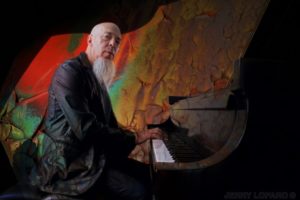
Ah, the teachers. Everybody has some kind of story with them. Maybe good, maybe bad, but they always leave us a mark. Now it’s keyboardist Jordan Rudess who tell his story. Take a look:
“Well, the way the story goes is – I was introduced to the piano in my second-grade classroom. I would go in and be very attracted to the piano and play.
“And one day, the teacher called up my mother and said, ‘Jordan is playing the piano very beautifully.’ And my mother was like, ‘What are you talking about? He doesn’t play the piano.’
“The teacher was like, ‘Yes, he does. He plays.’ So I started in the classroom and then – when my mother found out that I was starting to play it, naturally, she bought a piano and I started taking lessons.
“The funny part of the story is that the teachers started me on the usual little Red Book – you know, the little notes that everybody starts on and I learned the first piece but I was improvising a little bit on it.
“So the teacher came in he just said, ‘Forget about the book, I’ll just teach you to play without it.’ That was kind of the beginning and I started more as kind of an improviser.
“And then once people around me started to see that I have actually had some talent, they said, ‘Oh, you need to go to a serious music teacher!’.
“So that’s kind of the way everything began… I ended up going to Juilliard, I started Juilliard when I was nine and then I got to the point where I had to re-audition and go to the college level – because they have the preparatory division and then they have the college division.
“So I auditioned for the college level of Juilliard [School in NYC] and I got into that too and I went to that for almost a year.
“But then I left because the teacher was demanding that I memorized everything she assigned me the first week, and I was already very into to progressive rock and I was into my mini Moog and, you know, there was a lot of other things that I wanted to do.
“So even though I didn’t really have an idea – those days you didn’t have the Berkeleys and the Musicians Institutes, and places where you could really study cooler things – the only option was to go study like academic electronic music with one of the guys at Juilliard that was just making bleep-blop sounds – you know, terrible sounds.
“So I just said goodbye to them at Juilliard and went on on my own at that point.”
He added:
“Yeah, the reason I changed was because… in my teenage years, people started to turn me on to groups like Yes and Genesis, King Crimson and Pink Floyd – and I was very, very interested.
“But the real – the strongest influence was Emerson Lake & Palmer when my friend turned me on to the [1971] ‘Tarkus’ album and I realized that keyboards could have incredible power.
“I was aware of all the harmonies that I heard, that Keith Emerson was using in his music, but I didn’t… I wasn’t aware of that kind of power.
“So to hear that all together – his fusion of his harmonic synths, he used a lot of suspended chords and chords just built on fourths, plus this powerful sound, and that was like – a good driving force for me to start moving in a different direction.
“So as they say, the straw that broke the camel’s back was that the teacher at Juilliard was very intense, to me she was like, annoying – she demanded that I memorize everything.
“I said, ‘I don’t have time for this. I don’t want to do it.’ So that’s when I left.”